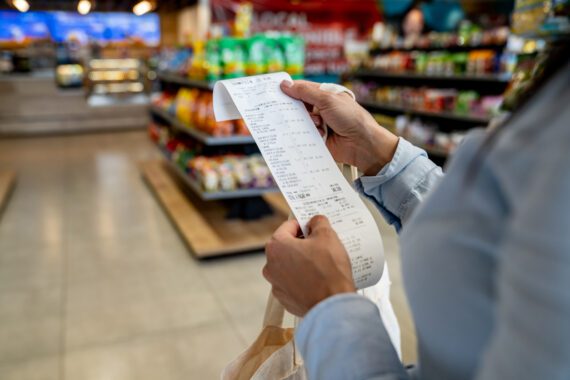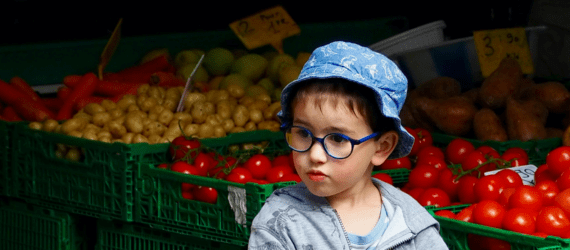By Isabel Vander Molen
Bread for the World has been a consistent advocate for the Food Date and Labeling Act, which was introduced in May 2023 by Sen. Richard Blumenthal (D-CT) Rep. Dan Newhouse (R-WA) and Rep. Chellie Pingree (D-ME). They were joined by six cosponsors.
The goal of this bill is to standardize U.S. food date labels. If it becomes law as part of the U.S. farm bill, which was scheduled for reauthorization in 2023 but has not yet been enacted, the Food Date and Labeling Act will help the United States make progress toward minimizing food waste.
It might seem that food labels would have a minimal impact on hunger in the U.S., but improving labels is important to Bread’s three main tenets of farm bill advocacy: nutrition, equity, and sustainability. Food labels contain information that can enable consumers to make informed decisions about how cost effective, nutritious, and sustainable their grocery options are.
According to the U.S. Department of Agriculture (USDA), an estimated 30 to 40 percent of the food produced in the United States is not consumed. The resources required to grow, harvest, package, and distribute it are wasted. According to ReFED, one of the leading organizations working to end food waste, the annual cost of food waste to the U.S. food system is $428 billion, distributed among stakeholders such as farmers, businesses, and households. For example, 22 percent of freshwater and 16 percent of cropland in the United States is used to produce food that is then wasted.
In 2018, the Environmental Protection Agency found that food waste is the largest category of material sent to landfills. Moreover, food waste takes a heavy toll on Earth’s climate, even in addition to the 372 million metric tons of carbon emissions created by producing wasted food. As it breaks down in landfills, food releases methane, a greenhouse gas far more potent than carbon dioxide.
Bread, as an anti-hunger organization, continues to emphasize that it is unnecessary for anyone in the U.S. to go hungry. In one study from back in 2010, food that went to waste was found to be worth an estimated $161 billion. Studies like these that reveal the enormous sums of money spent on wasted food confirm that the country does not have to allow hunger to persist. This is something American voters can change.
There is significant food waste at the household level. It is not clear precisely what share of household food waste is due to confusion over date labels, since shopping and cooking habits vary, but in a 2022 article advocating for passage of the Food Date and Labeling Act, Food Safety News reported that consumer food waste was estimated at 20 percent. In a 2022 study published in the Journal of Agriculture and Food Research, 75 percent of those surveyed said that they found food labels confusing and feel unsafe to consume food after the date on its label.
Food companies do not focus particularly on making the meaning of the labels clear to consumers. According to ReFED, labels are “generally not intended to communicate safety information.” The federal government does not set uniform standards for date labels, except infant formula. Therefore, standards vary widely according to state laws. As the researchers in the 2022 study of the role of food label confusion in food waste point out, the labels are not only highly inconsistent, but they are also not science-based.
The Food Date Labeling Act of 2023 would limit dates on labels to two main choices: “best by” and “use by.” There is also an option to add “or freeze by” to either when applicable. States would be required to repeal any laws against selling or donating food past the “best by” date, but not the “use by” or discard date.
An essential provision of the legislation instructs the USDA and the Food and Drug Administration (FDA) to work together to educate consumers and food companies about the meaning of the new labels and enable them to make good decisions.
As the evidence for the true cost of food waste grows increasingly definitive, and the 2023 farm bill remains under discussion in Congress, it is more important than ever to urge our elected representatives to pass the Food Date and Labeling Act and take other actions to reduce food waste.
Looking ahead, the enactment of the Food Date and Labeling Act could spur further opportunities to pass legislation that prioritizes consumer health and knowledge. This might include, for example, front-of-package nutrition data or information on sustainability.
Additionally, these efforts could contribute to reducing emissions from food waste and bring the U.S. closer to achieving the National Strategy for Reducing Food Loss and Waste by 2030. For these reasons, Bread for the World continues to mobilize advocacy efforts in favor of better food labeling policies.
Isabel Vander Molen is a Climate Hunger Fellow with Bread for the World



